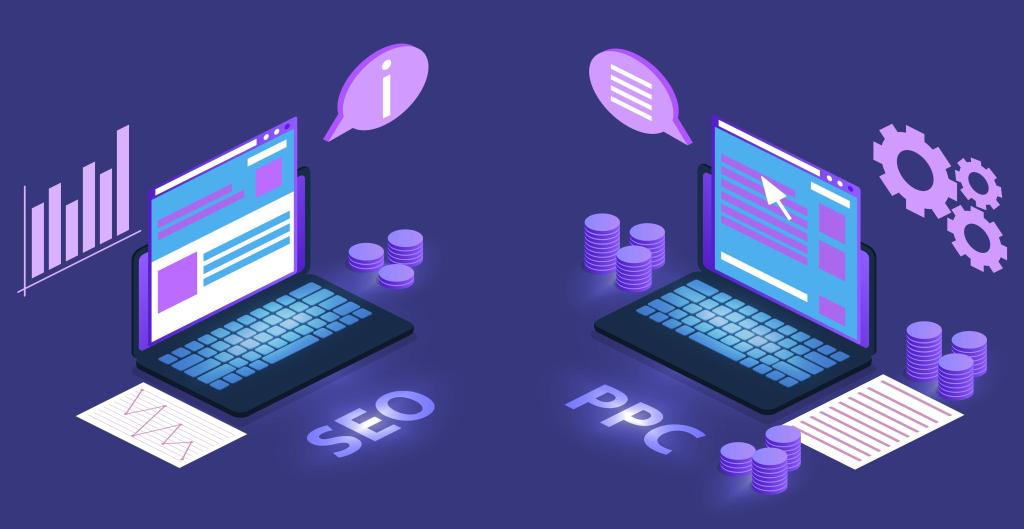You might be trying to decide which is better for your business: SEO (search engine optimization) or PPC (pay-per-click). There really isn’t an easy answer to this question because it depends a lot on your business and objectives. When it comes to SEO vs PPC, there are some differences to keep in mind.
What Are SEO and PPC?
SEO helps enhance your website’s visibility and gain organic traffic from search engines. It’s all about improving your website and content so search engines have a reason to show your website to people who are searching for things related to your business.
PPC is a form of search engine marketing (SEM) in which an advertiser pays a publisher like Google or Instagram for each click a person makes on an ad. Businesses only pay when customers interact with their ads. With PPC ads, you only pay for customers who click and then, hopefully, convert.
SEO vs PPC
When it comes to the differences between SEO and PPC, there are two big ones. With PPC, paid ads will appear above the SEO-influenced organic listings. SEO traffic is considered nonpaid, while PPC is paid advertising, often cost-per-click. PPC and SEO work best when used together strategically.
Pros and Cons of SEO
Here are the advantages and disadvantages of SEO:
3 Pros of SEO
There are a lot of benefits of SEO. Here are just a few of the pros of SEO when compared to PPC:
1. SEO Can Be Cheaper
While there is a cost to pay for SEO, including tools, time, deliverables, etc., it can be cheaper than PPC. Plus, SEO is a great investment for your business for its price point.
As you create useful content for your target audience, it helps drive traffic to your website, builds trust and authority in your business, and more. Plus, you don’t have to pay an advertiser anytime someone clicks to see that content unless you are choosing to pay to promote it on other platforms.
This is one of the reasons organic traffic, once established, can be more cost-effective. A strong content strategy will be very helpful in managing and making the most of your SEO.
2. Search Traffic Doesn’t Rely on Payment to Continue
One of the biggest pros of SEO compared to PPC is that it does not rely on payment to continue. Although you do need to continue SEO efforts over time and other factors can affect organic traffic, traffic from search engines doesn’t disappear once you stop paying for it as it does with PPC. Provided nothing else is going on, SEO helps your content stay in the search results and continue to bring traffic to your website.
3. Organic Listings Boost Brand Authority
It’s really important to build trust and brand authority for your business. If you consistently appear in search results of keywords relating to your products or services, this will help you build trust.
Showing up in search results for a topic indicates that search engines consider your website a useful, authoritative resource for that topic. Not only can that extend to more trust in your business for potential customers, but this can also help acquire more backlinks to your website from other reputable sites. This is one of many ranking factors that many search engines favor.
3 Cons of SEO
As with anything, there are some potential drawbacks to SEO as well. Here are a few cons of SEO:
1. Search Engine Algorithms Can Change
Search engines, including Google, change their algorithms. Sometimes, there are minor changes and sometimes they are complete overhauls that can have big effects on organic traffic, like many of the important Google updates over the years.
Although the big picture stuff doesn’t often change, search engines are businesses too and it’s important to understand how search engines work. This also means you will need to pay attention to your marketing strategy, as well as your organic search results.
2. SEO Efforts Need to be Ongoing
Just because your website might be bringing in traffic from search engines, doesn’t mean your job is over or that SEO is “done”. SEO efforts compound over time, which means doing the right things consistently over time to see success. It’s not like paid advertising that you can turn on and off and see results.
You will have to routinely optimize your content and continue to follow SEO best practices while improving and optimizing your website in order to continue to show up in search engines and get traffic from them. Optimizing your website could mean removing old content or refreshing content, updating keywords, redesigning your website, and more.
3. It Takes Time
SEO takes time, and can take even longer depending on the situation. If your website is new, especially in a competitive vertical with plenty of established authorities, it can take time to build up authority and trust and start to see the results of your SEO efforts.
This is because some of the factors that Google uses to rank websites won’t be established in the first few weeks or months; in general terms, you need to show a track record of value, trust, and authority. Quitting the process too early is a common SEO mistake so be sure to stick with it.
Pros And Cons of PPC
Here are some of the advantages and disadvantages of PPC:
3 Pros of PPC
PPC offers many benefits. Here are a few pros of PPC:
1. PPC Offers Quick Results
While it can take time to get traffic from search engines with SEO, PPC offers a much quicker result. You can start to see results with PPC ads in as little as a few hours.
2. PPC Ads Show Above Organic Listings
When running a PPC campaign, your ads will show above organic listings on search engines. Your website will be the first thing people see when they search for your keyword. This makes it exceptionally easy for your customer base to see your website first.
3. You Can Pinpoint Your Audience With PPC
If an exact demographic is helpful for your business, using PPC allows you access to define your exact audience. This is especially helpful if you want to pinpoint an audience based on age demographic or interest. Although you can try to reach a specific target audience with SEO, it’s not as exact as filtering ads to only show for people who meet certain parameters.
3 Cons of PPC
As with anything, there are potential drawbacks to PPC as well. Here are some cons of PPC:
1. PPC Costs Money
You cannot run a PPC campaign without spending some money since you have to pay for every click on a link. So once your budget is gone, so is your PPC campaign and the traffic generated from it.
Plus, PPC ads can get very expensive depending on the field you’re in. Legal and insurance are known as some of the industries with the highest PPC costs to be competitive. On average, expect to have a budget of several thousand dollars per month to run PPC ads effectively in search engines, and higher for national vs local campaigns.
2. PPC Has a Lower Profit Margin
Your PPC campaign may have immediate wins, However, it usually results in a lower profit margin. Since you have to pay per click, customer acquisition costs (CACs) will get higher unless you raise the prices of your products or services.
3. PPC Ads Can Become Stale Quickly
Since search engines set the rules, you have some control over your paid ad, but have limitations based on platform, ad type, campaign type, etc. Because of this, your copy may be very similar to someone else’s ad.
This, paired with things like ad blindness or banner blindness, increased competition, etc., can make it easier for yours to be passed over. This is another reason why it’s important to create a few ads at a time, test them for effectiveness, and continue to create new ads to test for improved results.
SEO vs PPC – Which is Better For Your Business?
SEO and PPC are both important for a successful business. Each offers its own strengths and weaknesses. It will depend on what your objective is in marketing, so that may mean using both regularly or sticking to one most of the time and implementing the other when you need to reach a certain goal.
Deciding between SEO and PPC comes down to your business and your goals. Take your time and evaluate the pros and cons of SEO versus PPC to figure out which is the best fit for you and your business.

